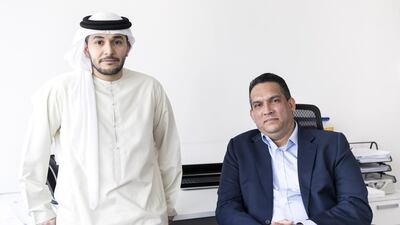Structural engineer Matthew Esther likes to look out of his window, to the offices where his competitors are hard at work.
For Mr Esther, a Briton who set up the Dubai structural-engineering firm Webb Yates & Esther last year with Mohammed Al Dah, an Emirati and fellow structural engineer, the fact that there are other small companies concentrating on such specialised aspects in Dubai is a complete change from the situation just a few years ago, when only big multinationals offered these services.
“We are not unique,” Mr Esther says. “There are a number of practices, both in terms of architecture and engineering, that have sprung up since the recession that are viable in standing on their own two feet, feeding a niche in the market that won’t even appear on the radar of the larger practices.”
Experts say the UAE’s construction market will grow at a faster pace than the wider economy. According to BMI Research, the value of the construction industry is set to increase to Dh181 billion next year from about Dh162bn this year, reflecting growth of 6.6 per cent – well ahead of the IMF’s forecast of 2.6 per cent for the wider economy.
And eight-strong Webb Yates & Esther is just one of a flurry of new start-up practices by building specialists who have either been laid off or are attempting to capitalise on a swath of smaller-scale property development around the city.
__________
Free advertisement
■ For SMEs who want to place an ad free of charge visit: www.thenational.ae/small-business-ads
__________
“We don’t have the capacity to do the really big scale metro projects,” Mr Al Dah says. “But if you wanted to do a project of three villas in Jumeirah and needed a structural engineer, then that would suit us. It’s a sign the market in Dubai has matured that there are even these sort of projects being built.”
Set up by Mr Esther, a former country director for engineering company Meinhardt, and Mr Al Dah, a director for technical affairs at Dubai Land Department, Webb Yates & Esther is part owned by the partners of British structural-engineering practice Webb Yates.
The company has completed a 30,000 square metre housing project in the UAE and is working on a couple of hotels in the region, as well as a scheme in the Seychelles.
As structural engineers working closely with architects to help design technical aspects of a building, such as the amount of wobble allowed in the floors, the pair have found it an uphill task getting through the red tape in Dubai.
In accordance with Dubai Municipality rules the company has had to register as “architects of record” and will have to employ an architect even though it only wants to do structural-engineering work. “It’s just one of the nuances of doing business in the region,” Mr Esther says. “In terms of the niche where we place ourselves in the market, we’re not heavy into engineering. We’re in that grey area between engineering and architecture.”
But the pair say not competing with architects is helping them win work in the Middle East.
“The fact that we don’t compete with architects is one of our strengths,” Mr Al Dah says. “Mainly the architects get the work. They put together bids to do work. When they win a bid they need to set up a design team very quickly. They can’t hire ten structural engineers, three mechanical engineers, etc. Instead they will call Matthew up and say ‘We have just got this residential building, we need help’. We can hire people if we need to, but we know we will have a number of projects where these requirements come up.”
Being partially owned by a British practice with a 10-year track record and a team of more than 40 people also gives Webb Yates & Esther a chance to get on the radar of clients, they say.
“If you look at a lot of the specialists across the world, let us say you look at tall building experts, bar very few companies, the upper echelon are actually small to medium-sized practices. At that level of expertise size is not that much of a deciding factor,” Mr Esther says.
“The selling point for these big multinationals is that they can take on all aspects of a big project because they have all the specialists somewhere in the world. But if there’s a brand that you want to launch, something where the attention to detail or particular architectural gem is how you want to push your brand, the hotel specialist might be a smaller practice.”
And setting up with a Dubai start-up gives its British cousin access to fast-growing construction markets.
“As a traditional UK practice their potential for growth is probably limited,” Mr Esther says. “Within the UK market the growth is steady but fairly flat. But the potential for growth in an emerging market is a lot more significant.”
lbarnard@thenational.ae
We are on the lookout for SME success stories. If you want to have your business profiled, contact us at business@thenational.ae
Follow The National's Business section on Twitter

